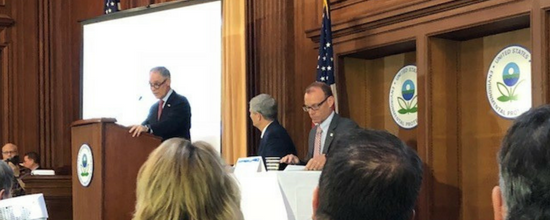
The National Ground Water Association had a seat at the table when the U.S. Environmental Protection Agency kicked off its summit discussing per- and polyfluoroalkyl substances (PFAS) with the nation’s governors on May 22.
NGWA was represented by Government Affairs Director Lauren Schapker and Seth Kellogg, a senior geologist at Geosyntec and NGWA Scientists and Engineers Board of Directors member.
The EPA stated the goal of the summit was to have participants work together to:
- Share information on ongoing efforts to characterize risks from PFAS and develop monitoring and treatment/clean-up techniques
- Identify specific near-term actions, beyond those already underway, that are needed to address challenges currently facing states and local communities
- Develop risk communication strategies to address public concerns regarding PFAS.
Following the meeting we asked Seth about what attendees indicated they’d like to see from the EPA around PFAS moving forward:
Seth Kellogg's comments on EPA Summit
Seth went on to say that PFAS regulation will be up to individual states, and stressed the importance of NGWA sharing its guidance document and knowledge with state partners.
PFAS up to states
NGWA Guidance Document
In a brief post-event discussion with Lauren, she outlined some of the regulatory needs and echoed the importance of sharing NGWA’s guidance document and PFAS research:
Lauren Schapker's comments
Late in 2017, NGWA published Groundwater and PFAS: State of Knowledge and Practice to address current concerns. This guidance document, divided into eight sections, details how the potentially hazardous compounds interact with groundwater and soil. Among the topics covered are human and ecological impact, fate and transport, field sampling and analysis, legal and regulatory issues, risk communication, and remediation and treatment.
NGWA will also host PFAS in Groundwater Workshop: The Professional’s Challenge on August 14-15 in St. Paul, Minnesota. The event will address the thought processes of practitioners regarding how to apply scientific and legal considerations to sites contaminated with PFAS.